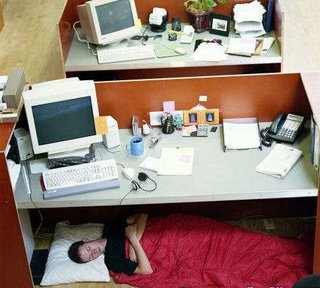 By TIMOTHY EGAN
By TIMOTHY EGANSEATTLE, Aug. 19 — In August, when much of the world is hard at work trying to do nothing, Jeff Hopkins and his wife, Denise, usually take a week to chase fish in Olympic National Park — a ferry ride and two tanks of gas from here with a boat in tow. But this year, their summer vacation is dead, a victim of $3-a-gallon gas and job uncertainty.
“This is our vacation,” said Mr. Hopkins, loading up his drift boat for an evening of fishing in the city just after getting off work at the Boeing plant, where he has been employed for 15 years.
Even before toothpaste could clog an airport security line and a full tank of gas was considered an indulgence, Americans had begun to sour on the traditional summer vacation. But this summer, a number of surveys show that American workers, who already take fewer vacations than people in nearly all industrial nations, have pruned back their leisure days even more.
The Conference Board, a private research group, found that at the start of the summer, 40 percent of consumers had no plans to take a vacation over the next six months — the lowest percentage recorded by the group in 28 years. A survey by the Gallup Organization in May based on telephone interviews with a national sample of 1,003 adults found that 43 percent of respondents had no summer vacation plans.
About 25 percent of American workers in the private sector do not get any paid vacation time, the Bureau of Labor Statistics reports. Another 33 percent will take only a seven-day vacation, including a weekend.
“The idea of somebody going away for two weeks is really becoming a thing of the past,” said Mike Pina, a spokesman for AAA, which has nearly 50 million members in North America. “It’s kind of sad, really, that people can’t seem to leave their jobs anymore.”
Shrinking-vacation syndrome has gotten so bad that at least one major American company, the accounting firm PricewaterhouseCoopers, has taken to shutting down its entire national operation twice a year to ensure that people stop working — for about 10 days over Christmas, and 5 days or so around the Fourth of July.
“We aren’t doing this to push people out the door,” said Barbara Kraft, a partner at the firm in the human resources office. “But we wanted to create an environment where people could walk away and not worry about missing a meeting, a conference call or 300 e-mails.”
The company tracks vacation time so that when employees fall behind, they are reminded through an electronic nag that they should be getting out of the office more. And posters evoking lazy days away from work were put up in the New York offices. Hint. Hint.
The heightened pace of American life, aided by ever-chattering electronic pocket companions, gets much of the blame for the inability of many people to take extended periods of forced sloth.
“I thought I would take at least five days off and go somewhere, but I couldn’t find the time,” said Tina Yang, who teaches first grade at Fruit Ridge Elementary School in Sacramento. She has the summers off, but her days are filled with catch-up work, conferences and projects, she said.
“I realize I just go to work and then home, work and then home — it’s no way to live,” Ms. Yang said.
The Travel Industry Association, the largest trade group representing the industry, found that the average American expects his or her longest summer trip to last only six nights. And it takes three days just to begin to unwind, experts say.
Company leaders at PricewaterhouseCoopers said they started their nationwide shutdown because people were not getting their batteries recharged. Now that the entire work force of about 29,000 takes a vacation, company officials say they are seeing positive results.
“It has taught our people what it is like to have unencumbered time,” Ms. Kraft said.
No comments:
Post a Comment